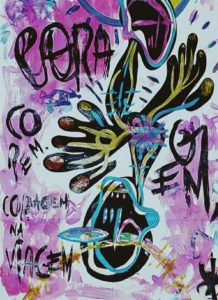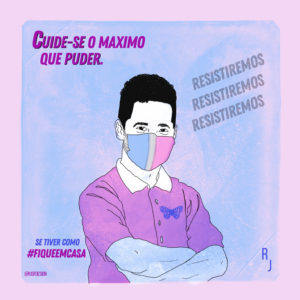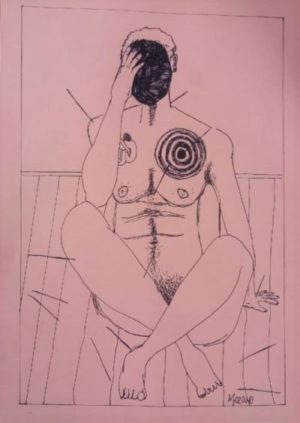Transmasculinity and Covid-19 in Brazil: Fear upon Fear by Anne Alencar Monteiro and Cecilia McCallum
Illustration by Marinho (@m_ciano) a Brazilian transman, art student at UFBA
Vicente is a black trans man resident in a low-income neighbourhood with the one of highest rates of confirmed cases of the new coronavirus in Salvador da Bahia, Brazil’s most African of cities. He is quarantining in the apartment where he lives with his girlfriend and mother. One source of anxiety is how to maintain regular testosterone applications. Going to a free, public health post is not an option. In the past, he says, he received ‘violent’ treatment in such a clinic and that is why he decided to organize his own hormone treatment independently. Until the pandemic struck, he had help to do the injections from his friend João, who is also a trans man and is experienced in self-injection. But when Salvador’s mayor instituted a policy of quarantine the situation changed. Because of social distancing rules, Vicente can no longer go to his friend’s house for the injections. He told me that this made him even more anxious, because, in addition to dealing with the fear of becoming infected with coronavirus, he needs to manage this vital aspect of his life. He needs to have a measure of control over who he is and who he is becoming.
Since the beginning of the quarantine in March, Anne, principal author of this text, has been in internet contact with Vicente and other trans men in Salvador as part of her doctoral research into the ways in which transmasculine people weave and break off relationalities with kin and others during their individual processes of gender transition. Coronavirus – and the need for social distance it imposed – has brought to the forefront trans mens’ relations with healthcare provision, in the wider context of public health policies and provision. It has also put to the test relations within their own families.
In this context, physical and mental health has emerged as a key area of concern for Anne’s interlocutors. Brazilian trans people already experience significant difficulties in accessing health care and in obtaining hormones (Arán, Murta & Lionço 2009). With the pandemic these difficulties have intensified. Those few who were in line for scheduled mastectomies through the free national health service had their operations postponed and medical follow-up cancelled, since such procedures are not considered essential. This has come as blow to those trans men who feel a strong need for such surgical interventions. However, for them relations with healthcare are already deeply conflicted. There is a fear that the pandemic will exacerbate the ever-present possibility of being mistreated, as Vicente was, and this adds to the fear of the infection itself. This is what Vitor, a 40-year-old black trans man, had to say:
“I take extra care for fear of being infected by the virus and needing to go to a public hospital and we know what public health in Brazil is like. And then imagine my trans body being treated in this pandemic situation in a public health setting […], I keep thinking about this treatment given to trans bodies in healthcare, because, I don’t know for other people, but I think that for us trans, one of the sectors in which we feel most exposed is the health sector, precisely because of the biologization of bodies ”.
Vitor directly links normative views among health professionals about the biological determination of gender to the possibility that he – and other transmasculine people – suffer institutional violence, as a direct consequence of their contra-hegemonic gender identities. Some trans men, Vicente included, are unable to obtain medical prescriptions that enable the purchase of testosterone, making continuing hormonal treatment even more difficult. This is a problem faced by Paulo, a 24-year-old black trans man:
“I do not have a prescription, so I am not taking testosterone, and also I don’t have anyone to inject it, because the person who applied it for me before was a friend, or else a colleague at work. But now I’m not using T, I’m missing T because I don’t know what will happen to my body from now on.”

Paulo’s situation is an illustration of how the current pandemic can affect what Gonzalez-Polledo (2017) styles testosterone’s ‘chemical timing’. Testosterone, as a chemical molecule, is a material part of the acquisition of characteristics considered masculine. As such it does not compose a simple linear transition from one gender to another; rather it produces different temporalities of change. These make the time of transition dynamic, characterized by uncertainties, by different speeds and tempos of progress (Gonzalez-Polledo, 2017). In Paulo’s case, the pandemic propels him into an unplanned and unpredictable future, one that will certainly be affected by the changes that the lack of testosterone might cause in his body, making the transition process even more uneven and non-linear.
Another question that many trans men face arises in those cases where they live with family members who do not understand and do not respect their gender transition. Facing gender violence within kin relationships is quite common in the lives of these men (Monteiro, 2018) but now, with the need to stay at home as a way to contain the spread of the virus, these relationships have become even more problematic. Diogo is a 37-year-old white trans man who has spent the quarantine period with his father and brother:
“My father is even calm, but my brother is an evangelical and this causes numerous problems. He was always very violent […] confinement with him is very stressful. Sometimes he does us psychological violence. He refuses to wear a mask and follow WHO instructions, and he is unable to leave [the house] or go places. I have been responsible for going out and shopping for everyone here from home, […] besides taking responsibility for the hygiene of everything that comes into the home.”
Like other trans men in Salvador, Diogo feels that his home life causes him to suffer a double burden –an overload that is both physical and psychological. This is also common among those who do not live with their relatives, as is the case with Igor, a 25-year-old black trans man:
“The pandemic ended up affecting me at work. I did have a job, then the company I worked for closed. I managed to pass an interview and got another job, but because of this pandemic I couldn’t go to the training and they ended up choosing to leave it for later. And then most of the problems started – to keep on getting food, because I live alone, to keep all this up and hormone therapy is really difficult.”
Igor does not have the problem of living with hostile relatives, but he feels constantly anxious, as he worries about how he will be able to afford his transition process or continue to pay for his home or even the bare necessities of life. Yet, despite their difficulties, in this moment of crisis trans men reinvent themselves. Vicente was forced to seek a new strategy to deal with the demands that the gender transition process imposes, in the face of the limitations caused by the need for social isolation. He again sought help from his friend João, who encouraged him to self-inject testosterone. João tried to guide him via Whatsapp and Youtube links on safe self-application. Even with all this, Vicente was terrified that something would go wrong. His girlfriend Luana, seeing his fear and frustration, offered to administer the injections. After searching for information on the internet and watching tutorials and nursing tips, she mastered the technique of applying the hormone. A few days later, Anne received a message via Whatsapp from Vicente to say that the first attempt had been successful.

As well as mutual aid amongst trans men in the face of the crisis, there has been an activation of the ties of solidarity between them and the cisgender people in their network of friends. The social movements of trans and transvestite people have been articulating and have managed to collect money, or food and personal hygiene items to compose basic baskets that were donated to trans people living in vulnerable situations. And it was through these donations that Igor has been able to guarantee his food: “I got the financial assistance that the government made available, but
even with that money, things were very tight […] I also got help from some NGOs and LGBT collectives here and that’s how I got the basic food baskets.”
It is still too early to be clear about the real impact of the pandemic on the lives of trans men and transmasculine people in Brazil, but one can say that they demonstrate a certain ability to reinvent themselves and to build personal and collective strategies to overcome the ongoing problems it has generated.
***
Anne Alencar Monteiro PhD candidate at the Department of Anthropology and Ethnology, Federal University of Bahia, Brazil, working on relatedness and trans men in gender transition in Brazil.
Cecilia McCallum is a Professorial Fellow, Department of Social Anthropology, University of St. Andrews. Associate Professor, Department of Anthropology and Ethnology, UFBA, Brazil; Professor in the Postgraduate Program in Collective Health, ISC- UFBA; Member of MUSA- The Gender and Health Studies Program – at ISC-UFBA.
REFERENCES
ARÁN, Márcia; MURTA, Daniela; LIONÇO, Tatiana. Transexualidade e saúde pública no Brasil. Ciência e Saúde Coletiva, Rio de Janeiro, v. 14, n. 4, p.1141-1149, jun. 2009.
GONZALEZ-POLLEDO, EJ. Transitioning: Matter, gender, thought. New York: Rowman & Littlefield International, 2017.
MONTEIRO, Anne Alencar. Homens que engravidam: um estudo etnográfico sobre parentalidades trans e reprodução. 2018. 137 f. Dissertação (Mestrado) – Curso de Antropologia, Universidade Federal da Bahia, Salvador, 2018.

